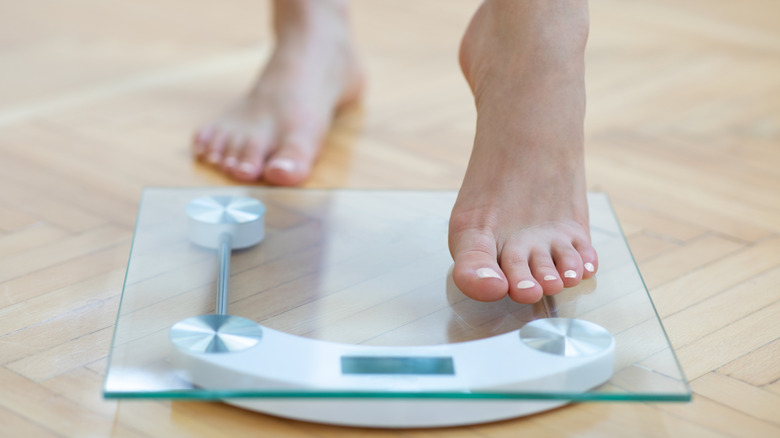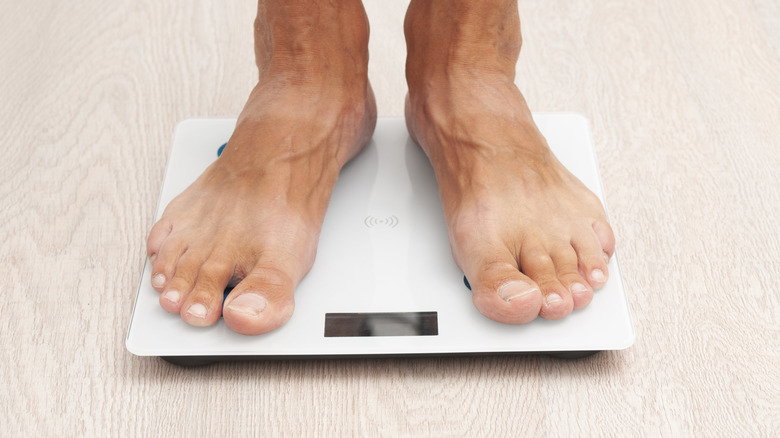How Do Smart Scales Get Their Measurements? (And Are They Accurate?)
When most of us get serious about losing weight or getting in shape, one of the first things we buy is a scale. However, these days, not just any scale will do. If you're like most people, you want to know more than just how much you weigh; you'd also like information about your body composition, including your body fat percentage, muscle mass, and water weight — all stats smart scales claim to measure. When paired with exercise and healthy eating, smart scales promise to help us reach our fitness goals, offering us a clear snapshot of our progress or lack thereof. You might find that having all of that information keeps you motivated and helps you make more informed choices about your health.
However, sometimes you may step on the scale and it may seem like the numbers just don't add up. Maybe you've been doing a strength training routine on a workout app to help you meet your fitness goals, only to find that the body fat reading on your scale doesn't budge, or you've been crushing your step goals on your fitness tracker, only to find the scale doesn't seem to accurately reflect your progress.
Before you throw in the towel, it's important to realize it's not just you. Smart scales use a method called bioelectrical impedance analysis (BIA), typically through a foot-to-foot impedance meter, to measure things like body fat and muscle mass. While this may sound like a high-tech way to track your fitness metrics, it's really an imperfect science. However, if you understand how smart scales get their measurements, you can better use that information to focus on what matters and ignore the noise.
How do smart scales get their measurements?
If you just want to measure your body weight, smart scales work just like any regular scale. But that's where the similarities end. Depending on the brand, smart scales can estimate your body fat percentage, basal metabolic rate, body mass index, muscle mass, body water percentage, bone mass, and heart rate. Since these scales measure different things, it's a good idea to become familiar with how to choose the best smart scale for you before you go shopping for one.
Smart scales use a technology called bioelectrical impedance analysis (BIA) to determine how much of your body weight is made up of fat, muscle, water, and other tissues by measuring how easily a small electrical current passes through your body. Most of these scales use a foot-to-foot impedance meter with sensors underneath your feet, where the current flows up one leg, across the pelvis, and down the other leg to estimate your body's composition. When the current travels through water and muscles, it faces little resistance because they are good conductors. However, when the current passes through fat, it encounters more resistance, because it's a poor conductor.
From there, a smart scale feeds that resistance data into a mathematical formula along with your age, height, and gender (users typically input this information into a smartphone or smartwatch app that syncs with the scale) to calculate your estimated body composition metrics, including total fat, muscle, water, and bone mass. The more resistance detected, the higher your calculated body fat percentage is likely to be.
Are smart scale readings accurate?
According to a study published in JMIR mHealth and uHealth, while smart scales may be an interesting way of tracking your health data and keeping track of trends over time, they're not 100% reliable. One limitation of smart scales is that they only measure the fat in the lower half of your body. If you tend to carry more fat in your lower body, smart scales might overestimate your body weight. Likewise, if you experience swelling in your legs, this could throw off the reading. If you're dehydrated, a smart scale may overestimate your body fat percentage because the electronic currents it uses will face more resistance. If you're overhydrated, these scales may underestimate your body fat.
For those looking for accurate body composition methods, there are alternatives, but typically you'll have to leave home to use them. The Dual-Energy X-ray Absorptiometry (DEXA) scans are often considered the most precise option for measuring bone density, fat mass, and lean muscle mass. While DEXA scans are the best way to determine your body composition, they're not cheap, and you'll have to go to a hospital, medical imaging center, or specialized wellness clinic to get one.
Alternatively, calipers are a more accessible method that can be more accurate than a smart scale when used by trained fitness professionals. To estimate your body fat, a fitness professional uses calipers to pinch skin at multiple points on your waist and hips. When all is said and done, you should think of smart scales as a helpful guide; just don't expect lab-grade accuracy from your bathroom scale.


